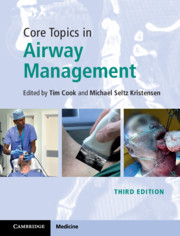Book contents
- Core Topics in Airway Management
- Core Topics in Airway Management
- Copyright page
- Contents
- Contributors
- Foreword
- Preface to the Third Edition
- Section 1 Airway Management: Background and Techniques
- Section 2 Airway Management: Clinical Settings and Subspecialties
- Chapter 22 The Airway in Obstetrics
- Chapter 23 The Paediatric Airway
- Chapter 24 Airway Management in Obesity
- Chapter 25 Maxillofacial and Dental Surgery
- Chapter 26 Ear, Nose and Throat Surgery: Airway Management
- Chapter 27 Lung Separation
- Chapter 28 Airway Management in the Critically Ill
- Chapter 29 The Patient with a Tracheostomy
- Chapter 30 Pre-hospital and Trauma Airway Management
- Chapter 31 Airway Management during CPR
- Chapter 32 The Bloody and Bleeding Airway
- Chapter 33 The Airway in Anaesthesia for Transoral Robotic Surgery
- Section 3 Airway Management: Organisation
- Index
- References
Chapter 24 - Airway Management in Obesity
from Section 2 - Airway Management: Clinical Settings and Subspecialties
Published online by Cambridge University Press: 03 October 2020
- Core Topics in Airway Management
- Core Topics in Airway Management
- Copyright page
- Contents
- Contributors
- Foreword
- Preface to the Third Edition
- Section 1 Airway Management: Background and Techniques
- Section 2 Airway Management: Clinical Settings and Subspecialties
- Chapter 22 The Airway in Obstetrics
- Chapter 23 The Paediatric Airway
- Chapter 24 Airway Management in Obesity
- Chapter 25 Maxillofacial and Dental Surgery
- Chapter 26 Ear, Nose and Throat Surgery: Airway Management
- Chapter 27 Lung Separation
- Chapter 28 Airway Management in the Critically Ill
- Chapter 29 The Patient with a Tracheostomy
- Chapter 30 Pre-hospital and Trauma Airway Management
- Chapter 31 Airway Management during CPR
- Chapter 32 The Bloody and Bleeding Airway
- Chapter 33 The Airway in Anaesthesia for Transoral Robotic Surgery
- Section 3 Airway Management: Organisation
- Index
- References
Summary
Obesity is a risk factor for increased difficulty in most modalities of airway management. It decreases ease and effectiveness of face mask ventilation, supraglottic airway device use and front of neck airway techniques and probably makes laryngoscopy more difficult. When difficulty occurs, airway rescue techniques are more likely to fail in the obese patient. Obesity also increases the risk of aspiration and difficulty in lung ventilation, both of which may necessitate changes in anaesthetic technique. Most importantly, obesity reduces the time available for airway management before hypoxia supervenes. To worsen matters, obesity reduces the efficacy of pre-oxygenation and safe apnoea time is less prolonged with apnoeic oxygenation techniques than in the non-obese population. To compound these factors obesity is associated with obesity-specific (e.g. obstructive sleep apnoea, obesity hypoventilation syndrome) and non-specific co-morbidities (diabetes, asthma, hypertension). With increasing numbers of obese patients and increasing degrees of obesity in the surgical population it is essential that all anaesthetists are familiar with the potential complications of airway management in the obese and the techniques that may mitigate or manage risk.
- Type
- Chapter
- Information
- Core Topics in Airway Management , pp. 206 - 213Publisher: Cambridge University PressPrint publication year: 2020



